The Benefits of Anaerobic Digestion are wide and the creation of renewable energy, such as biogas (largely methane), is just one of them. Below, we provide a detailed list of the benefits of anaerobic digestion. We think that this is the most comprehensive document available on this subject.
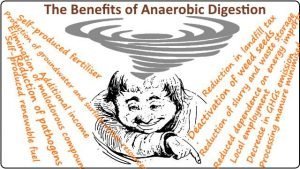
Before focusing on the details, we begin by taking a more general overview of the advantages of anaerobic digestion in general by considering the technique as an energy producer, and a waste management technique.
Benefits of Anaerobic Digestion as an Energy Producer
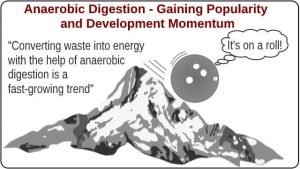 All businesses whether agricultural or industrial benefit from the ability to diversify their income sources. One of the big benefits of anaerobic digestion is that it provides diversity of income. When times are difficult in one area of a business, an organisation which produces biogas will be better able to survive market lows and the trading difficulties which occur from time to time.
All businesses whether agricultural or industrial benefit from the ability to diversify their income sources. One of the big benefits of anaerobic digestion is that it provides diversity of income. When times are difficult in one area of a business, an organisation which produces biogas will be better able to survive market lows and the trading difficulties which occur from time to time.
In other words, the AD process, by providing an energy source is ideally suited for owners to benefit in this manner from a greater diversity of business income.
Benefits of Anaerobic Digestion as a Waste Management Technique
Individuals and companies that install their biogas plant, and especially farm businesses, frequently comment that until they owned an anaerobic digestion facility they did not appreciate the extent to which integrating the AD process into their waste management enabled them to tackle previously intransigent problems with their waste disposal. That's one of the major benefits of anaerobic digestion/ advantages of biogas.
Another advantage of anaerobic digestion is the ability to manage companies more holistically and prevent resource waste. One of the main advantages of anaerobic digestion is enhancing the sustainability of organic waste management.
Any company looking for shareholder investment is finding it increasingly crucial to be able to demonstrate its environmental sustainability.
Incorporating a biogas plant into many companies can help to reassure investors of the long-term viability of the company, as shareholders are increasingly concerned with sustainability.
Why the Benefits of Biogas Production are Becoming More Important with Each Year that Passes
Unlike fossil fuels like oil and coal, biogas does not add to the greenhouse effect, a factor that has encouraged the European Union to undertake favourable measures for promoting the utilisation of this eco-friendly fuel, providing a further stimulus to European biogas market.
Many countries are relentlessly striving to curb greenhouse gas emissions in order to maintain environmental safety – for instance, Germany is planning to cut down its emissions by 40% by 2020 and close to 95% by 2050, under its Climate Action Program.
Among the different processes of converting biomass to energy, anaerobic digestion is one of the most convenient and eco-friendly means of conversion that has been widely adopted by European consumers, owing to which the anaerobic digestion-based European biogas market has gained quite a momentum in recent times.
Landfill gas, which was previously vented out in the atmosphere, is now also being increasingly captured in the form of biogas, owing to its composition – the gas comprises at least 45% methane and is captured through anaerobic digestion of waste at landfill sites. That's one of the unplanned benefits of anaerobic digestion.
This advantageous recycling of waste material has added a new dimension to the waste management domain. In response, a favourable legal framework is being set in place to further harness waste management that would give a suitable boost to the overall European biogas industry. via Europe biogas market to exceed 14000 MW annual installations by 2024
Benefits of Anaerobic Digestion as Recently Summarised by the UK's Anaerobic Digestion and Bioresources Association.
AD is an environmentally friendly, cost-effective solution to dealing with much of what we think of as “waste”. Instead of burning it, or sending it to landfill, AD plants could potentially turn that waste into 30% of the UK’s household gas or electricity demand. This means less waste to landfill, stable energy prices, and fewer carbon dioxide emissions – with 35,000 potential jobs too. Biogas has the advantage of being essential for decarbonising our transport system and for improving the air in our cities and towns.
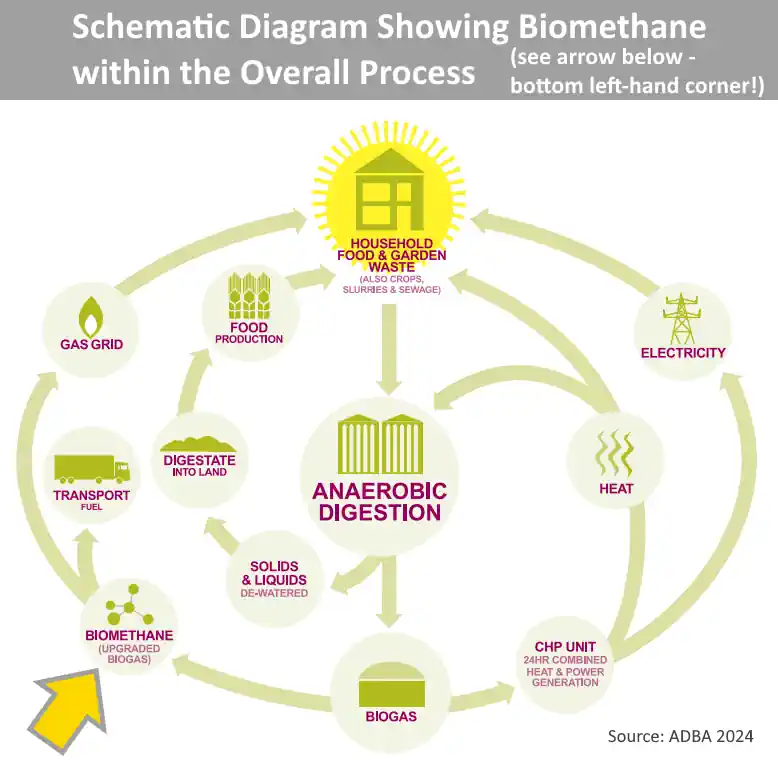
The non-energy benefits of Anaerobic Digestion are numerous but as of yet they have not been linked to financial support mechanisms; support has only been provided for energy generated. It is time for the full range of benefits of AD to be recognised, for their role in achieving the following policy objectives, all key to the success of the 25-Year Plan:
- Reducing emissions from rotting manure, farm wastes and slurries, replacing petrochemical-derived artificial fertilisers, abating significant amounts of carbon and replacing fossil fuel-derived energy sources.
- Supporting farmers by diversifying their income, providing a steady income that is not dependent on fluctuating global commodity prices, and reducing input costs;
- Improving food security through profitable crop rotation and the recycling of essential crop requirements of Nitrogen (N), Phosphorous (P), Potassium (K) and trace elements through the spreading of digestate back to farmland, replacing the need for petrochemical-derived artificial fertilisers from overseas;
- Increasing organic matter, improving soil structure, reducing water demand, reducing soil degradation and run-off;
- Strengthening the rural economy by creating jobs: the UK AD industry currently employs 3,500 people and has the potential to employ a further 15,000 in the agricultural sector and 30,000 more widely; and, finally one of the benefits of anaerobic digestion which is often neglected is,
- Developing low-carbon technology and expertise to export to global markets. via Written evidence – ADBA
How Anaerobic Digestion Benefits Cities
We made the following video which highlights the benefits of anaerobic digestion in cities:
Commonly websites list the benefits as if they were limited to the products of anaerobic digestion, as follows:
AD technology utilises various organic wastes to create the following benefits of anaerobic digestion:
- Biogas, which can used as electricity, heat, or renewable natural gas
- Solid digestate for animal bedding, composting, etc.
- Liquid digestate for land application as fertilizer. via BIOFerm™
But, there are yet more benefits of anaerobic digestion, such as:
Diversion of Organics from Landfills
Organic materials can be separated from the municipal solid waste (MSW) stream and processed in an anaerobic digester. These materials include:
- Food scraps from residential properties
- Food scraps from businesses (e.g., restaurants)
- Commercial food processing waste;
- Fats, oils and greases, and
- Yard waste.
Keeping organic materials out of landfills is beneficial for the environment. If these materials are allowed to decay in landfills, methane and carbon dioxide can be released into the air and contribute to climate change.
The loss of valuable nutrients from our ecosystem is another downside to landfilling organic materials. When these materials are anaerobically digested, the resulting nutrients found in digestate can be used to feed and nourish the soil. … via US EPA [The US EPA website also lists, Renewable Energy Generation, Soil Health Benefits, and Methane Emissions Reduction and manure management as AD benefits.]
Anaerobic digesters on livestock farms have many benefits of anaerobic digestion when compared to traditional manure management systems, including:
Diversified Farm Revenue
Looking for ways to diversify revenue is critical to the long-term financial viability of many farms. While manure has always traditionally been a resource on the farm as a fertilizer, alternative products can be produced creating new income-generating opportunities. Maximizing the value of manure increases farmers’ resiliency to the uncertainty of commodity product markets.
Manure digester systems provide:
- “Tipping fees” received for the management of non-farm organic waste streams. This not only boosts direct revenues but provides additional biogas for energy production.
- Organic nutrients from the liquid and solid by-products of digested manure. These can be used both on-farm or sold to other local or regional agriculture and horticulture sources.
- Animal bedding or peat moss replacement from digested solids.
- Biogas is produced from the breakdown of the manure. Biogas is a source of renewable energy for electricity, heat, and fuel for on-site use or sale to the local grid. via AgSTAR: Biogas
Rural Economic Growth
As farmers look to innovative ways to economically and environmentally manage their manure, there are opportunities for rural economic growth. Constructing and operating digesters offers new local job opportunities and increases local tax revenue.
Manure digesters create opportunities for:
- Local expertise in contracting, site work, concrete, plumbing, electrical, permitting, and engineering during planning and construction.
- Skilled labour to keep the system running at optimal levels once operational.
- Businesses built around nutrients, manure solids, and energy markets. Cooperative business models can share the risk and reward across farms and private investors.
- Agro-tourism: advanced manure management has served as a springboard for people to visit farms, where they learn more about environmental improvements and where their food comes from.
Conservation of Agricultural Land
Healthy soil and water is important to farmers, their families and the community. The vast majority of farms in America are family-owned and active conservation practices can continue to pass this legacy from one generation to the next.
Implementing manure digesters in livestock facilities can:
- Improve soil health by converting the nutrients in manure to a more accessible form for plants to use.
- Help protect the local water resources by reducing nutrient run-off and destroying pathogens.
Energy Independence
Many early farms and other agricultural operations, such as mills, were often energy-independent, getting their power from wind or water sources. Manure provides an opportunity for farm energy independence. Biogas from manure is composed of more than 50% methane, the primary component of renewable natural gas.
Manure digester systems can:
- Meet on-farm energy needs. Biogas can be used to generate electricity for lighting barns or houses, heat for warming barns and on-site greenhouses, energy for cooling milk, and fuel for running on-site vehicles. It allows the farmer to operate ‘off the grid’ and reduces reliance on utilities.
- Provide energy to the local grid. This can help the local utility meet growing energy demand with locally sourced renewable energy.
- Reduce greenhouse gas emissions by capturing methane gas that may otherwise have been lost to the atmosphere and by displacing fossil fuel energy use. via AgSTAR: Biogas …
Sustainable Food Production
A safe, nutritious, and affordable food supply is needed to sustain populations worldwide. Farmers work hard to meet the growing food demand and remain viable in today’s global marketplace. Efficiently using water and nutrients for crop and animal needs can cut costs, reduce environmental impacts, and contribute to a safer, more productive farm.
Manure digesters on livestock farms can:
- Protect animal and human health by reducing pathogens.
- Convert nutrients in manure into a form that is more accessible for plants to use compared to raw manure. This can increase crop productivity and yield.
- Recycle nutrients on the farm, creating an economically and environmentally sustainable food production system.
- Produce heat, electricity, or fuel from biogas which can be used on-farm, lessening the agriculture sector’s dependence on fossil fuel energy.
- Accept food waste from places like restaurants and grocery stores. This means less food waste is sent to landfills. Food waste has the added benefit of increasing the efficiency of farm digesters.
Agronomic Advantages
Transformation of the liquid manure and the manure into a fertilizer, more easily assimilated by the plants, with a reduction in the odours and the disease-causing agents
- Organic waste processing for competitive prices
- Insect elimination at the storage pit
- Odour suppression. via Advs of AD
- Nutrient Management:
Organic waste (including food, manure and wastewater) contains valuable nutrients. Through AD the material retains its nutrients, while pathogenic organics and foul odours are eradicated. The nutrient-rich residues which remain at the end of the AD process are; a nutrient-rich liquid which can be sprayed onto or injected into the land and a nutrient-rich compost-like soil improver which can be spread onto soil as an alternative to chemical fertiliser. via What's AD
Carbon Credits & Renewable Energy Credits (RECs)
By reducing methane released into the atmosphere and generating energy from renewable resources, Anaerobic Digestion systems can produce two types of environmental credits:
- carbon credits and
- renewable energy credits.
Voluntary and compliance markets for both of these credits exist in North America. Credits can be used to meet compliance standards, allowing digester owners to avoid fines imposed when compliance standards are not met. Additionally, the selling of unneeded credits results in supplementary revenue.
Waste Disposal Savings
For all organic waste that goes into a digester, approximately 60% of the volume remains after digestion.
Because the volume of organic waste is reduced through the anaerobic digestion process, significant cost savings can occur from the avoidance of disposal needs. This results in vast reductions in the amount of waste material that needs to be hauled away. via AD Financial Advs
Anaerobic digestion (AD) also produces less air and solid emissions than incineration, landfill pyrolysis and gasification.
Farm-Community Relationships
Maintaining good relationships with neighbours is important as populations continue to grow and farms become physically closer to new housing or commercial developments. Reducing odours and other impacts of livestock can improve farm-community relations and make business growth possible for farmers.
Manure digester systems can help:
- Reduce odours from livestock manure.
- Provide an easier path to farm growth. Limiting the impacts of the farm on the local community makes farm expansion plans much more palatable to local citizens.
- Connect farmers to their communities. On many farms, the installation of these systems has provided a ‘teaching moment’ with school kids and adults alike. Many farms regularly run tours of their digester systems, allowing people to learn about digesters and biogas energy, as well as where their food comes from and how it’s produced.
via AgSTAR: Biogas …
The Benefits of Anaerobic Digestion of Food Waste at Wastewater Treatment Facilities
 The anaerobic digestion of food waste has many benefits, including:
The anaerobic digestion of food waste has many benefits, including:
- Climate Change Mitigation – Food waste in landfills generates methane, a potent greenhouse gas. Diverting food waste from landfills to wastewater treatment facilities allows for the capture of methane, which can be used as an energy source. In addition to decreased methane emissions at landfills, there are greenhouse gas emissions reductions due to the energy offsets provided by using an on-site, renewable source of energy.
- Economic Benefits – Wastewater treatment facilities can expect to see cost savings from incorporating food waste into anaerobic digesters. These include reduced energy costs due to the production of on-site power and tipping fees for accepting food waste.
Diversion Opportunities – Most municipalities are investing in ways to divert materials from landfills. This is usually due to reduced landfill space and/or recycling goals. Wastewater treatment facilities offer the opportunity to divert large amounts of food waste, one of the largest waste streams still going to landfills. … via US EPA
So Many Advantages… So How Have We Benefited So Far?
The first use of biogas is believed to be as early as 10 B.C., to heat bath water.
Anaerobic digesters can destroy more than 90 percent of disease-causing bacteria that might otherwise enter surface waters and pose a risk to human and animal health.
In 2013, energy generation from anaerobic digesters on livestock farms was approximately 840 million kWh equivalent—enough for almost 53,000 homes’ energy use for a year.
GHG reductions in 2013 from livestock anaerobic digester projects were equivalent to the consumption of 284 million gallons of gasoline – enough to fill almost 33,500 gas tanker trucks!
Odors from anaerobically digested manures are significantly reducing odours, compared with odors from typical storage and land application. via AgSTAR: Biogas
Cost Advantages of Anaerobic Digestion
Many cost advantages will benefit you directly including:
- Self-produced fertiliser
- Self-produced renewable fuel
- Additional income
- Reduction in landfill tax bills
- Reduction of slurry and waste storage.via FarmingAD
Conclusion
To summarise, we provide a “big list” of the environmental, economic and energy benefits of anaerobic digestion below and we end with a viewpoint on why there are not a lot more AD plants on farms already.
- Anaerobic digestion provides a variety of benefits. These may be classified into three groups viz. environmental, economic and energy:
- The environmental benefits include:
- Elimination of malodorous compounds.
- Reduction of pathogens.
- Deactivation of weed seeds.
- Production of sanitized compost.
- Decrease in GHG emission.
- Reduced dependence on inorganic fertilizers by capture and reuse of nutrients.
- Promotion of carbon sequestration
- Beneficial reuse of recycled water
- Protection of groundwater and surface water resources.
- Improved social acceptance
Anaerobic digestion is advantageous in terms of energy generation in the following manner:
- Anaerobic digestion is a net energy-producing process.
- A biogas facility generates high-quality renewable fuel.
- Surplus energy as electricity and heat is produced during the anaerobic digestion of biomass.
- Anaerobic digestion reduces reliance on energy imports.
- Such a facility contributes to decentralized, distributed power systems.
- Biogas is a rich source of electricity, heat, and transportation fuel.
The economic benefits associated with a biogas facility are:
- Anaerobic digestion transforms waste liabilities into new profit centres.
- The time devoted to moving, handling and processing manure is minimised.
- Anaerobic digestion adds value to negative value feedstock.
- Income can be obtained from the processing of waste (tipping fees), sale of organic fertilizer*, carbon credits and sale of power.
- Power tax credits may be obtained from each kWh of power produced.
- A biomass-to-biogas facility reduces water consumption.
- It reduces dependence on energy imports.
- Anaerobic digestion plants increase self-sufficiency. via Env Eco
With So Many Benefits – Why Aren't There More Anaerobic Digestion Plants on Farms?
With all of the potential benefits, one might wonder why relatively few farms utilize these systems. One major reason is that anaerobic digesters are expensive to install and operate. The economic benefits have, in the past, been limited to a reduction in electricity purchased by the farm, which is not enough to offset the costs of the system.
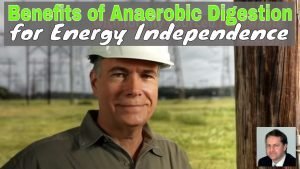 As the interest in renewable energy sources increases, farms are increasingly able to apply and receive carbon credits. Some farms also accept off-farm waste, collecting tipping fees, to co-digest with manure. In many states, more favourable net-metering laws have also made the economics more favourable. Power generated by the digester is valued at retail costs rather than wholesale costs.
As the interest in renewable energy sources increases, farms are increasingly able to apply and receive carbon credits. Some farms also accept off-farm waste, collecting tipping fees, to co-digest with manure. In many states, more favourable net-metering laws have also made the economics more favourable. Power generated by the digester is valued at retail costs rather than wholesale costs.
The decision to install a digester is often driven by additional considerations, such as nuisance issues. A digester greatly reduces the odor potential of the manure, which also greatly reduces neighbors' complaints and the potential for lawsuits.
At the current time, anaerobic digestion is slowly but surely increasing as a manure treatment method in the United States. Additional information is available at: Economics of Anaerobic Digesters for Processing Animal Manure.
Use of Terms/Definitions
Fertiliser: “A fertilizer ( American English ) or fertiliser ( British English) is any material of natural or synthetic origin (other than liming materials ) that is applied to soils or to plant tissues (usually leaves) to supply one or more plant nutrients essential to the growth of plants .”

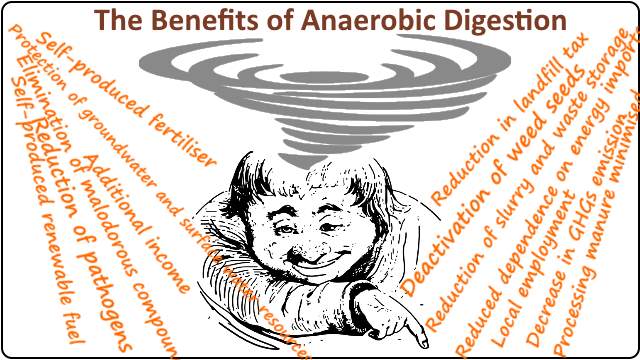
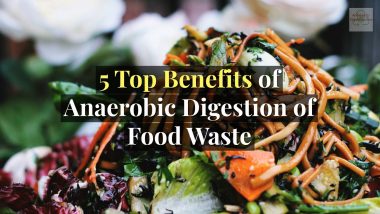
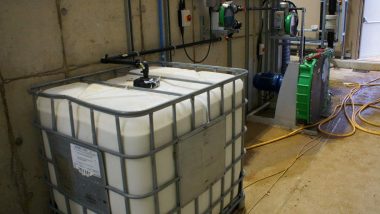


Hi there humongous useful page. I am using it for my college project. Can you really be serious though? “Elimination of malodorous compounds”. Did you mean stopping the thing stinking? lol!
Lol! Liking the 1st cartoon. So may benefits that cartoon guy looks drunk with the idea!
Всегда помните о пользе использования отходов. Использование отходов имеет двойную выгоду, возникающую из-за отсутствия свалки этих отходов. Продолжайте публиковать эти статьи. Отлично.
Always remember the benefit of using waste. Using waste has the double benefit that comes from not having to landfill this waste. Keep posting these articles. Very good.
Biogas is good, but why not use solar? There are many great ways to do that. For example, if your home has a pool or hot tub, look into a solar water heating system. Installing a solar water heating system costs about the same as a conventional system, but operating costs for the system will be much lower. Repair costs for solar heating systems are often lower as well.
Heads up guys – econet romania brings together a strong network of representative German and Romanian companies, organizations and institutions promoting solutions and technologies for sustainable economic development.
honest resource. recommended. Thorsens recommend “Sites that Talk”.
Local communities may want to consider the benefits of taking energy planning and security into their own hands. To turn this vision into a reality, planning and preparation is the key. This article explores the benefits of AD for local communities and some of the key legal considerations that must go into your AD business plan. Click the link in our name Runcie, above.
Hi Biogas reborn website.
But what will you do about the male/ female imbalance for industries like this, especially during construction?
Gender diversity in the construction industry is shockingly poor. Women make up just 11% of the entire workforce, but even this figure includes many who work behind a desk, often in design, management or secretarial roles. On building sites themselves, it is estimated that 99% of workers are men. The UK has the lowest proportion of female engineers in Europe and only 14% of entrants to engineering and technology first degree courses are women.
O.K. It has many benefits, but so does owning a Roller. If it’s un-affordable it don’t matter how many benefits. It’s hypothetical in the extreme.
Hi there! Can you answer this. Solar power is renewable, and its simple to do. So, why not spend your money on that? Spend the money you make on fertilizer, heating the farm etc. Keep it simple!
Great information, but a little too long to read and take-in. Suggest a re-write be done to organize all these AD benefits. Otherwise, awesome.
I see there are many reasons for doing anaerobic digestion. So why isn’t it more popular?
The good is here, but where the bad?
Howdy! Do you know of Bähler Biogaz who do the design and construction of anaerobic digestion plants? They say they have worked on more than 20 successful projects in Canada over the past 10 years, and have developed a unique expertise in the infrastructure design, construction and installation in the anaerobic digestion sector.
It really is time to wake up and face the truth before it is too late. We will not survive much longer as species if we do not develop clean energies fast enough. Biogas is just one thing which we must do. There are many others.
None of this will work reliably if done on the cheap. Reliable, professional and high-quality equipment is essential. I worked for an organization which didn’t get this. It was all built using the cheapest kit that could be bought, and the result was a very hard or near impossible plant to keep going…
helpful site. if we go into biogas our main reason will not be for the energy output, useful as it is.
Unique thoughts over usage of waste, I appreciate your efforts. People should read this article and must know the importance of wastage. Thank you for this information.
looks amazing, for rural living. Not sure, for the general/city population. Average household use, in the U.S., is 30kwh per day. 2,000lbs. of dung per day to power roughly 2 homes. Would need to incorporate for Humanure and veggie waste input, too. That’s a lot of poo.